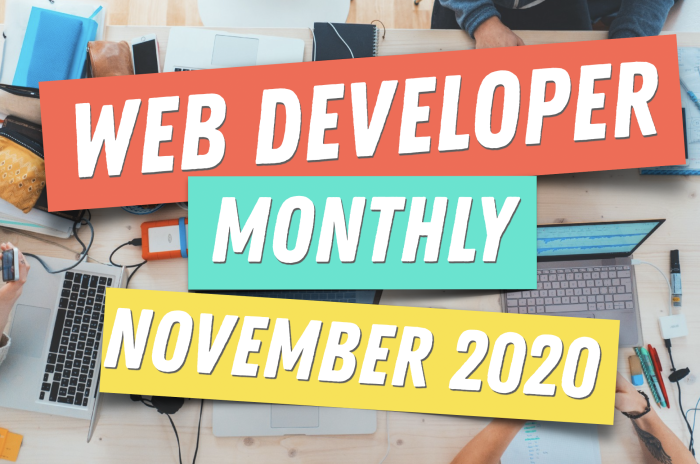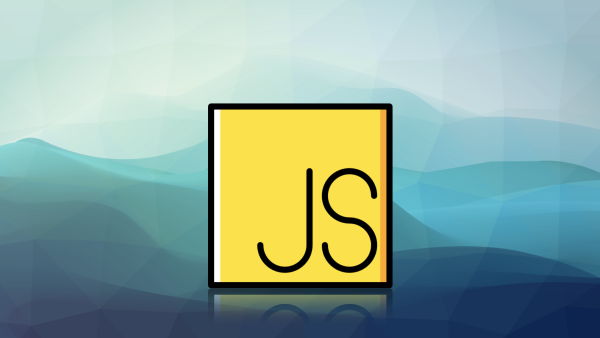29th issue! If you missed them, you can read the previous issues of our Web Developer Monthly newsletter here.
If it’s your first time here… (otherwise, skip this part)
Being a web developer is a fantastic career option. You have many job opportunities, you can work around the world, and you get to solve hard problems. One hard thing, however, is staying up to date with the constantly evolving ecosystem. You want to be a top-performing web developer, coder, programmer, software developer, but you don’t have time to select from hundreds of articles, videos and podcasts each day.
This monthly newsletter is focused on keeping you up to date with the industry, keeping your skills sharp, without wasting your valuable time. I will be sharing the most important articles, podcasts and videos of the month. Think Tim Ferriss and the Pareto Principle (80/20 rule) meeting the Software Development world. What’s the 20% that will get you 80% of the results?
What you missed in November as a Web Developer…
JavaScript Memory Management 🎁
Stacks, heaps, garbage, leaks. All things to describe my friend Scott's apartment. They are also key words used in talking about JavaScript memory management. Often these types of articles can get overly complex, but not this one. Enjoy this in depth look at how memory is used in your javascript programs!
Free Tools For Web Developers ✂️
Some tools and assets to help you build your next project since we are best friends by now (unless this is your first time reading my articles… in that case let’s take things slow):
- You like color palettes? Then this is a good month for you, you, and you
- Free TailwindCSS "it's all the rage" templates
- Another free logo maker in your arsenal
- Browser and phone CSS mockups
- Everybody gets free icons!
- Illustrations for your next project
- Figure out your favourite coding font
- Next time you need a slogan for your new startup
- Avatars everywhere
React News 💎
Mostly everyone's favourite frontend library. What crazy things have they been up to?
-
If you're like me and you're constantly wondering: "why do we even need Hooks?", then this article does a great job describing where this idea of hooks came from. Hooks are actually based on some prior concepts, mainly: Algebraic Effects.
-
Speaking of hooks (since that's the only thing the React community likes talking about lately), this is the #1 article I have found on best practices when using React Hooks.
-
You know what? I like you. You're still reading this newsletter. As a thank you, how about some React security best practices as well?
-
What?! You're STILL here? OK, I really like you now. So let's finish this off with another article: React component code smells to avoid.
-
The popular React partner in crime, Redux got a whole new documentation look with new and fresh ways of explaining what Redux does and how it helps you manage state. Worth a refresher.
-
Slack employees/engineers created a new analytics logging library for React.
-
Chakra UI, a simple, modular and accessible component library that gives you the building blocks you need to build your React applications is v1.0.
-
How Coinbase optimized their React Native code.
SPA vs The World 🤼
Recently, I have been writing a lot about the shift in the industry towards non Single Page Applications. What do I mean by that? Well, instead of me writing about it, this person did a great job breaking down the alternatives to Single Page Applications which dominated the early 2000s and 2010s. Some really new libraries and tools mentioned here that you should keep an eye on.
No Code Will Take Away Your Job 🧬
Just kidding. There is nothing to be worried about. As a matter of fact, this is a great read on when No Code is useful and where Code outshines it. These two are playing in a different market.
FireFox HTTPS-Only Mode 🧯
The new FireFox 83 update has a highly debated security feature: HTTPS-Only Mode. When you enable HTTPS-Only Mode...
- Firefox attempts to establish fully secure connections to every website (HTTPS)
- Firefox asks for your permission before connecting to a website that doesn’t support secure connections (uses HTTP instead of HTTPS)
Quantum CERNtainty ⚗️
If you get my pun above, you earn 10 points for Hufflepuff. CERN is offering free classes on Quantum computing for anyone who wants to be ready for 2050. Check it out here.
Deno 1 1/2 🦕
Deno 1.5 recently came out and the big news is that they have a new TypeScript bundler based on Rust. For those who are into Deno (and if you aren't what are you waiting for?), this has solved a big performance bottleneck and it has led to a 3x performance improvement when you type-check your code. Big step in getting Deno into that Node territory wink wink.
Ps, Node.js is learning from Deno, and they are evolving too. This is nothing but good news for the JS runtime market.
Ethereum Is Back 🧟♂️
It never really left, but Ethereum 2.0 is here for those that remember the cryptocurrency hype. The long-planned upgrade to the Ethereum network aims to solve problems with the network’s scalability and security. In its first phase, the blockchain “world computer” will switch to a proof of stake consensus mechanism vs the old proof of work.
Svelte Fan Club 🕺
For those of you who are part of the Svelte fan club, you may have seen me mention last month the Svelte Summit talk given by its creator discussing the future of Svelte. Since then, there have been lots of questions brewing, so they answered them all in this blog post.
Next.js Making Moves 👾
Next.js 10 was recently released, and it may mean the end of Image Optimization APIs. That is because with Next.js you will now get built-in image optimization (unnecessarily large images are usually the biggest bottlenecks to web speeds), and they even announced an out of the box ecommerce store using Next.js. A few other amazing out of the box solutions coming out of Next.js that you can read about here. All that VC investment money is going to good use. If you want the full breakdown, you can watch the keynote they had from their virtual conference here.
GraphQL vs REST 🚧
What is this, 2018?! Sure, we're sick and tired of reading these types of articles by now, but this one is actually pretty good and reminds you when you should not use GraphQL.
My easy opinionated rule: If you only have 1 server, you probably shouldn't use GraphQL.
=> + += &= ~ 🐌
Enter a JavaScript operator to learn more about it: Operator Lookup. I thought I knew all the operators, but that was not the case... some new ones in there!
Why Go? 🦦
Although we talk a lot about JavaScript in this newletter, there are many other languages we can use on the backend for web development. One of those, is Golang from Google. Its power comes when you get into concurrency. Here is an overview of where it came from, and when it should be used.
BEM vs Tailwind 🛠
Two of the most popular approaches to writing and maintaining CSS battle it out in this article. Comparing them is a bit like comparing apples and oranges, in that while they’re separate, they’re still fruit.
Ps Tailwind CSS 2.0 just came out!
Angular, Didn't Know You're Here 💃
Angular 11 is here. Sure, it may not be as slick, hip, and sexy as React, Vue and Svelte these days, but it's also a powerful framework still widely used... (although you wonder how many projects these days actually start with Angular)
2 Big Mistakes 💁♂️
Two big mistakes that a lot of newer developers make:
1. Building 192379742 mini, insignificant, coding projects thinking that is the key to learning (it's not).
2. Building things that don't push your boundaries beyond what you already know, and are comfortable with (i.e. simple websites).
So here is a fun weekend project idea if you want to work with Amazon Alexa or Google home using Javascript: Jovo
How To i18n Right 🎎
Internationalization and localization is more than just writing your content in multiple languages. A very important topic that is often overlooked is explained in extreme detail in this wonderful article.
TypeScript At Scale 🧗🏾
Now that TypeScript is becoming the default at some companies, it's important to keep in mind some best practices. Here are 10 Insights from Adopting TypeScript at Scale
Ps TypeScript 4.1 came out with more new features that 98% of you will never use. Instead, just browse through this list of some best performance practices.
UX/UI Overview 👩🎤
So you didn't want to take my new Mobile and Web Design course? I get it... you have other things to do, other people to learn from. Well, if you really don't want to take that course, here is a brief overview (for free) of some good UI/UX practices, including design laws and principles, visual design, and design processes.
New Libraries and Tools 🗿
Just because we had a ton of these this month, I've added them into this section. Check out these shiny new things:
- Microsoft released the new .NET 5.0.. Why should you care? .NET 5 moves towards a single set of APIs, languages, and tools to target a broad set of application types, including mobile, cloud, desktop, and IoT.
- Remember when jQuery carousels where all the rage back in the day? Well, now you can have the modern carousel with Fliking.
- The epitome of simplicity: MVP.css
News Around the World 🗺
-
If you have ever used youtube-dl, then you may have heard of the big news this past month. Then Github (i.e. Microsoft) stepped in to bring it back.
-
World Wide Web founder Tim Berners-Lee, announced an enterprise version of the Solid privacy platform, which allows large organizations and governments to build applications that put users in control of their data.
-
Developers are getting sick and tired of big companies benefiting from open source projects. This one made a splash: "Respectfully, I am no longer going to support Fortune 500s ( and other smaller sized companies ) with my free work. There isn't much else to say. Take this as an opportunity to send me a six figure yearly contract or fork the project and have someone else work on it."
Big Tech News 🏢
-
Big news out of Apple. It's not really news, because we knew that Apple was going to have its own CPUs in their laptops. The M1. What is news is just how much better these chips are than the market out there. People are losing their minds. Trust me on this one: watch this 30 minute documentary to see how they got here and why it is so impressive.
-
A few more Apple news items since they had a big month: Apple is releasing the number of requests that they receive from each country's governments for user data. Also amidst complaints about the app store, Apple's new program reduces App Store commission to 15 percent for small businesses earning up to $1 million per year.
-
Here is another story of Amazon taking some cool piece of technology that they see a potential (to making money) in, copying it, and using their deep pockets to make it even better. Bye Bye Docker Hub?. Also, when AWS goes down, your Roomba suffers.
-
Zoom lied to users about end-to-end encryption for years, FTC says. Standard Zoom.
-
Ant Financial Group was about to have the biggest IPO in history. Then, it all got ruined. If you want to dive deep into this, then read this.
-
For those that care about these things, Red Hat is transitioning to Podman from Docker (who knew there was an alternative!?).
Completely useless to your career but still great 🙃
-
If you don't spend at least 5 minutes playing with this, then you are a robot. WebGL wonder.
-
Ummm...what?
Best Resource of the Month ✅
A published research paper (largest of its kind) was released on to answer the question: What distinguishes great software engineers? This was an in depth study with multiple interviews (1,926) and a 31 page report. Luckily for you, here is the summary: After synthesizing the findings, we believe that the top five distinguishing characteristics of great engineers are writing good code, adjusting behaviors to account for future value and costs, practicing informed decision-making, avoiding making others’ jobs harder, and learning continuously.
Finally, I know this is a tech related newsletter but this is too good not to share. It's an important reminder: What you pay attention to becomes your life.
Trick of the Month 🌗

-
Make your terminal system monitor look and feel like you're in a sci-fi movie.
-
How to make $200 million with a push of a button.
-
Ping, but with a graph.
By the way, my full-time job is to teach people how to code and get hired in the most efficient way possible as the Lead Instructor of Zero To Mastery Academy. You can see a few of my courses below or see all of my courses by visiting the courses page.






